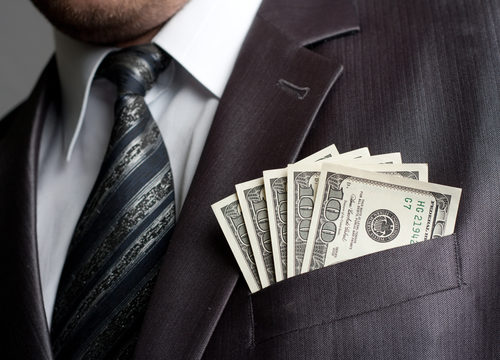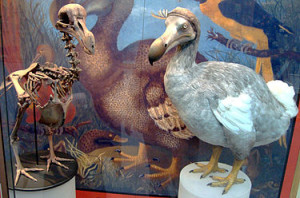According to the online encyclopedia Wikipedia, “The dodo was a flightless bird native to the island of Mauritius, east of Madagascar in the Indian Ocean. The last widely accepted sighting of a dodo was in 1662. Its extinction was not immediately noticed, and some considered it to be a mythical creature”. Hundreds of creatures have become extinct since 1662 but the poor dodo has become the symbol for extinction. And the question now is will cash become a dodo bird?
How often do you use cash?
I used to carry $50 or more in cash. Today I carry maybe $20 or sometimes no cash at all. I rarely write checks either. My debit card is my friend. I use it to pay for everything I can. It’s not only more convenient than carrying cash but it creates a record of my spending that I can use in my budgeting. Today we now also have everything from PayPal to Bitcoin and from Samsung Pay to Apple Pay, which altogether make it look as if cash is on its way to becoming just another dodo bird. However, the Federal Reserve Bank of San Francisco (FRBSF.org) released a study in 2012 that 40% of an average consumer’s transactions were in cash. That was more than debit cards, which were 25%, credit cards at 17%, electronic payments at 7% and checks also at 7%. In fact, the number of bills in circulation has increased about 5% per year. Of course, that study was done BEPS or before all the new electronic payment systems.
There are times when cash is better
You probably know this already but most vending machines require cash. In that same Federal Reserve Study, “consumers used cash for two-thirds of the transactions more than $10 and for half of all payments less than $50”. And here’s something you probably didn’t know –retailers are legally allowed to refuse credit cards for transactions of less than $10. And some will even give you a discount if you pay cash. Of course, in the real world retailers generally will let you use plastic – especially a debit card – to pay for any purchase right down to ninety-nine cents or maybe less.
Cash can’t be hacked
You’ve probably read or seen reports about the data breaches that have occurred in the past year including the one at Target, Anthem and even the US government’s Office of Personal Management. But no one can hack cash. This is why many people have turned to using cash so that hackers can’t get their credit card information.
Using cash lets your buy stuff anonymously. When you use any of the electronic payment alternatives now available you leave a track of your spending that could be hacked. A third reason why plastic can be better than cash has to do with theft. If your identity or your credit cards are stolen you’re pretty much protected because in most cases your liability will be limited to $50 and most credit cards issuers will even waive that if you report suspected activities as soon as you spot them. The same is basically true of debit cards as banks will generally reimburse you for any fraudulent charges on one. In comparison, if you lose a lot of cash or are the victim of a robbery, you’re totally out of luck.
Using cash can be costly
Anytime you use an ATM to get cash outside of your “network” it will undoubtedly cost you money. According to an article published on CNN.com, the average ATM fee when withdrawing from a non-affiliate of your bank is $4.52. In some cases, that will be $2 per transaction. You can beat this by checking with your bank’s website to see where there are there are in-network ATMs near you. You could also use a checking account where your ATM surcharges will be reimbursed. For example, Ally Bank will reimburse up to $10 a month. And some banks have ATMs where you can get cash by arranging to make the withdrawal on a smart phone app and then use it to scan a QR code so that the ATM will display “no card required.”
Use cash for a tough love budget.
Cash can be a great tool for budgeting. If you find that you have a tough time controlling your spending when you use credit cards, then using cash or a debit card would be best for your finances. When you make cash the primary way to pay for purchases you’ll probably treat your money more carefully. For a really tough budget, divide your cash into envelopes for each of your budget categories such as groceries, utilities, clothing, eating out, entertainment and so forth. Then when you find one of those envelopes empty, that’s it. You can’t spend any more money in that category unless you move some cash from another envelope. The negative of this is that you won’t be able to use any of those apps that automatically track your spending. However, you can create virtual envelopes using apps like GoodBudget and Mvelopes and get the best of both worlds – a complete record of your spending and envelope budgeting.
Using cash won’t help your credit score
Finally, when you pay for most of your purchases with cash they won’t go on your credit reports so won’t help your credit score. Even if you prefer using cash you should still pay for a few of your routine purchases now and then with a credit card. When you create a history of using that card sensibly and responsibly you’ll end up with a better credit score, which will save you money on interest and get you better terms on a mortgage, an auto loan or any other loan. In fact, a credit score of 700 or better could help you rent a house or apartment or even get a job as many employers today routinely check the credit histories of their job applicants.
It’s not going away anytime soon
While we may be on our way to a cashless society this isn’t something that’s going to happen soon. As you have read, there are still reasons to carry and use cash. It may someday become a dodo bird but that’s not going to happen anytime in the near foreseeable future.






